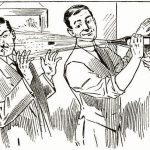June 16, 2006
Some schoolteachers in England have been using simplified versions of Shakespeare plays because students find the originals "difficult" and "intimidating", meaning the teachers have to "work". It’s bad enough that some people still debate whether Shakespeare even wrote Shakespeare’s plays, as if it would make a difference if they’d been written by Shumley Crabtree. If it’s that important to you, think of "Shakespeare" as a brand name. Just remember that Guiness would be just as good even if its inventor had been named Arthur Fleminpuke.
But I digress. Why can’t Johnny read Shakespeare? Translating Chaucer is understandable. Saying Chaucer wrote in English is like saying chow mein is Chinese, but even though it’s been almost four hundred years since Shakespeare died there’s not that much difference between his English and ours. It’s a little more flowery, and, okay, no one really knows what a "bodkin" is anymore, and anyone who laughs during the opening scene of "Romeo And Juliet" when Sampson and Gregory are passing puns about coals, choler, and collars is just showing off. Those lines are probably something Will overheard in the pub and jotted down while trying to think of something to write about, and when that scene was first performed the audience members probably looked at each other and said, "I guess you had to be there."
But I digress. When I was a student the only time Shakespeare was intimidating was when walrus-faced, pink-haired teachers made us watch Laurence Olivier put the ham in "Hamlet" while they sat in the back and drank cleaning fluid. When I had teachers who were actually interested in teaching, who understood that even the most difficult lines are easier if you take a little time and let students read them out loud, then even "The Tempest" made sense. Shakespeare’s language can be hard to follow, but does it really need to be dumbed-down?
According to examiners teenagers include references to pop culture and conversational remarks in their test essays, which just proves that teenagers, unlike the test readers, are smart enough to figure out that Shakespeare’s still relevant. And they’ve figured out how to translate him into their own idiom, instead of letting their teachers pose as "with it" people whose efforts to speak street-lingo are about as authentic, and contemporary, as The Monkees. When Macbeth thinks stabbing King Duncan might not be a good idea, Shakespeare’s Lady Macbeth wears him down, asking, "Art thou affear’d/To be the same in thine own act, and valor,/As thou art in desire? Would’st thou have that/Which thou esteem’st the Ornament of Life,/And live a Coward in thine own esteem?" It’s tough stuff. Fortunately we have the modern translation which cuts her speech down to, "Cowardly custard!" Yeah, that’d convince me to stab someone. It just wouldn’t necessarily be the king. Who needs rhetorical questions, anyway? You don’t need to answer that, but extra credit will be given if you can correctly copy the word "rhetorical".
And in the end when Macbeth realizes Macduff’s going to kill him, he says, "Before my body,/I throw my warlike Shield: Lay on Macduff,/And damn’d be him, that first cries hold, enough." That’s Shakespeare’s version. The modern translation changes Macbeth’s death speech to "Oh flip." I can’t tell you how many times I’ve looked death in the face and said, "Oh flip." Actually I guess I can tell you how many times I’ve done that: zero. I can also think of another f-word that describes the people who wrote this stuff: flipping idiots.
Romeo and Juliet’s exchanges don’t fare any better. Their clever back-and-forth leading up to their first kiss is rendered, in the same way fat is rendered in soap-making, with Juliet asking, "What are you thinking about?" Romeo says, "Oh, just moons and spoons in June." Juliet replies, "Wow. Give us a snog then." This makes the translations useless for American students who have no idea what a "snog" is. Then there’s that powerful scene in "A Midsummer Night’s Dream" when Titania sees Bottom for the first time, Shakespeare has her say, "So is mine eye enthralled to thy shape;/And thy fair virtue’s force perforce doth move me." What the heck’s that all about? Does that mean she likes him? Fortunately there’s the modern translation: "Nice ass!"
But I digress. I made up one of those quotes. If you’re not sure which one it is that should tell you something. Teachers who use this stuff want to avoid asking students to use their brains, which might give them a feeling of accomplishment, and possibly even provide them with skills for the future. Instead they’re teaching a more important lesson: Skip the hard stuff, kids. And if you come up against something really difficult, just say, "Oh flip."






Facebook Comments